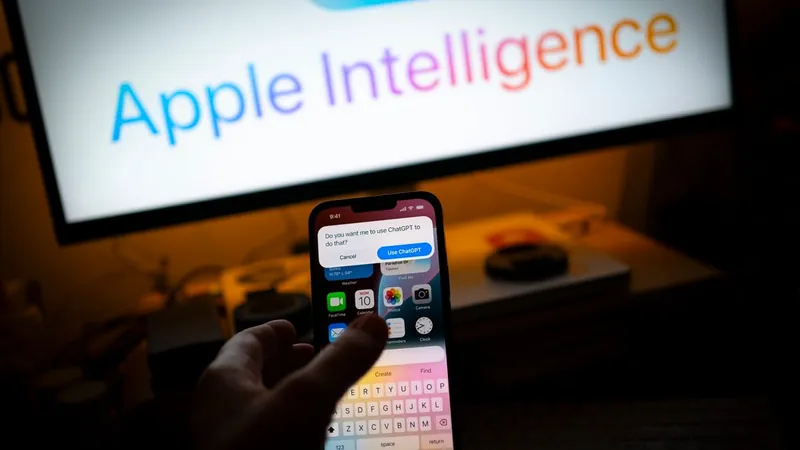
The Race for AI: Google, Amazon, Apple, and the Future of Your Everyday Devices
2024-11-18
Author: Jia
Big Tech is on a mission to integrate artificial intelligence (AI) into the devices you use every day—transforming everything from your smartphone to your smart home. Companies like Meta, Apple, Amazon, and Google are investing billions to ensure that AI becomes a seamless part of your digital life, tapping into the massive potential of this groundbreaking technology.
Meta, the parent company of Facebook and Instagram, has launched an AI chatbot for its platforms, aiming to rival popular services like ChatGPT. Apple has finally entered the AI game with its newly unveiled Apple Intelligence, which debuted in late October. This comprehensive suite promises to enhance user experience by understanding and generating language, creating images, and even crafting new emojis. Google, meanwhile, has integrated AI summaries into its widely used search engine and introduced its chatbot, Gemini. As for Amazon, it is upgrading its smart home device, Alexa, although the launch has faced challenges.
According to Tejas Dessai, director of research at Global X, user behavior is key to the successful adoption of AI technologies. As more people become familiar with chatbots and virtual assistants, they will naturally begin to expect these functionalities in the devices they already own. The integration of AI into popular platforms is crucial to this evolution, an opportunity that Apple is eager to exploit.
Dan Ives, a tech analyst with Wedbush, predicts that the “consumer AI revolution” will be driven by accessible devices. He estimates that in the coming years, 20% of the global population will use AI through Apple devices alone, with over 2.2 billion active Apple devices currently in circulation. Ives believes that a surge of generative AI apps will emerge, particularly surrounding the anticipated iPhone 16.
Additionally, renowned Apple designer Jony Ive is reportedly launching an AI-focused hardware startup, collaborating with OpenAI's CEO Sam Altman. However, Altman suggests that users won't necessarily need new hardware, as AI capabilities could be delivered via existing devices and cloud technology.
The roll-out of AI is expected to occur in phases. First, the establishment of AI infrastructure is already underway, followed by software development, and finally, user-friendly interfaces like chatbots. Dessai envisions transformative interfaces that will reshape everyday tasks such as financial services, travel, food ordering, and daily planning.
Major tech companies are making strides to integrate AI into their products. Meta has announced that its AI system has over 500 million monthly users, potentially making it the leading AI assistant globally by 2024. The introduction of AI-driven features is not only enhancing user engagement on platforms like Facebook and Instagram but is also set to boost Meta’s overall business prospects.
Conversely, Apple has experienced a more tumultuous start. While the iPhone 16 has seen robust sales, early feedback for Apple Intelligence has raised concerns. A survey revealed that many smartphone users remain skeptical about the usefulness of AI features, with one in four users unconvinced of its benefits.
Amazon, headquartered in Seattle, is also striving to keep pace. Plans are underway to enhance Alexa with AI capabilities powered by Anthropic's Claude models after significant investments in the startup. During a recent earnings call, CEO Andy Jassy announced the integration of more advanced AI into Amazon's devices, including the Kindle.
The competition is fierce, with Google’s Home and Nest devices gearing up for their generative AI upgrades. By 2027, it is estimated that over 130 million households will have at least one smart speaker, marking the growing prominence of these AI-infused devices.
In conclusion, the future of AI integration into everyday technology looks promising but will be gradual. As smartphones, vehicles, and home electronics continue to evolve, Dessai envisions a future where AI simplifies tasks and enhances the way we interact with our devices. While the journey toward this reality is just beginning, the potential for AI to impact our daily lives is immense—and the race among tech giants is just heating up. Keep an eye on these developments because the future of technology is not only exciting; it’s on the cusp of transformation.



 Brasil (PT)
Brasil (PT)
 Canada (EN)
Canada (EN)
 Chile (ES)
Chile (ES)
 España (ES)
España (ES)
 France (FR)
France (FR)
 Hong Kong (EN)
Hong Kong (EN)
 Italia (IT)
Italia (IT)
 日本 (JA)
日本 (JA)
 Magyarország (HU)
Magyarország (HU)
 Norge (NO)
Norge (NO)
 Polska (PL)
Polska (PL)
 Schweiz (DE)
Schweiz (DE)
 Singapore (EN)
Singapore (EN)
 Sverige (SV)
Sverige (SV)
 Suomi (FI)
Suomi (FI)
 Türkiye (TR)
Türkiye (TR)